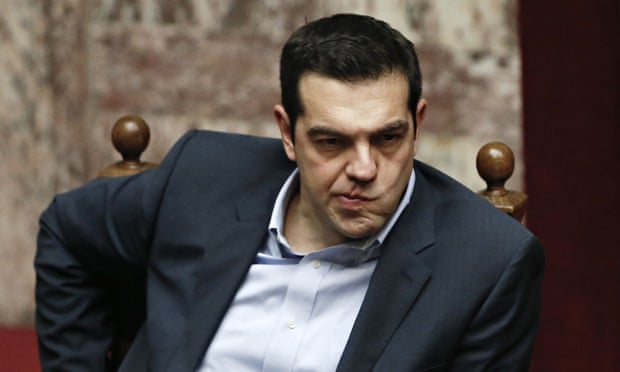Editorial Thursday 7 May 2015
Negotiations between Greece and its creditors have been badly mismanaged. It is time to stop grandstanding and reach a compromise
Alexis Tsipras, prime minister of Greece. ‘Mr Tsipras, who does not lack political acumen, recently opted for a more conciliatory tone by sidelining his fiery finance minister, Yanis Varoufakis.’ Photograph: Petros Giannakouris/AP

The European project has a history of pulling out of a crisis precisely at the moment when it seems things are doomed. This moment could soon be reached over Greece. A sign of solace may have come on Wednesday, when Greece made a €200m repayment to the International Monetary Fund, ahead of a meeting of the Eurozone finance ministers on Monday – although this doesn’t mean a breakthrough is imminent. For three months, a battle of brinkmanship has been going on between the government of Alexis Tsipras and its European creditors over a cash-for-reforms plan that would give Greece the €7.2bn worth of rescue funds that it needs to meet its debt payments. Tensions have run so high that a Greek stumble out of the Eurozone has recently started to be described as a lesser evil compared with the current uncertainty. Both sides are certainly calculating that the other will eventually blink first. Greece’s public finances are in a dire state and its growth forecasts have been slashed. Turning to Moscow for a bailout was never going to be a serious option. So Mr Tsipras continues to be faced with the herculean task of having to balance democratic expectations (his campaign promises) with European realities.
It hasn’t helped that his government’s negotiating tactics have become overwhelmingly perceived as having more to do with posturing and lecturing than with readiness to find a compromise. Syriza believed its electoral victory back in January would take Europe into a whole new anti-austerity direction. That has not happened. On the contrary, all of the other Eurozone countries have dramatically formed a bulwark against Greek demands, in a take-it-or-leave it attitude. Whereas the Tsipras government thought it could find allies by painting Germany as the problem, it has found itself up against an EU-wide front of exasperation. The crisis has been mismanaged from both sides.
It is true that Mr Tsipras, who does not lack political acumen, recently opted for a more conciliatory tone by sidelining his fiery finance minister, Yanis Varoufakis. The Greek government may also have a good point when it complains about divisions among its creditors – the EU and the IMF not seeing eye to eye on some issues. In the end, if a way can be found out of the deadlock, it may involve Mr Tsipras telling voters that, for all it was worth, he fought to the very limit. His grandstanding will in that case have served a purpose. He is after all well aware that Greeks, however exhausted by austerity, prefer to see their country inside rather than outside the European club.
Much of what is going on among the negotiators remains veiled in secrecy, which is perhaps understandable in diplomatic matters. But the endless haggling between Greece and its creditors has become detrimental both to Greece and to the European Union as a whole. An accidental Grexit would be a leap into the unknown for everyone. It would be the first major dent in the common European currency. It would bring geopolitical damage. An agreement needs to be reached – the sooner the better.
The Guardian view on Greece: dangerous brinkmanship | Editorial | Comment is free | The Guardian
![The [Greek] European Tragedy](https://blogger.googleusercontent.com/img/b/R29vZ2xl/AVvXsEiWKI5s90SFm1wWTk6bs4p7CgslaC2SnYPsrZhb-B-smOufNNCSxCvpBLI9hOB-LsXZjir_PNmEiMk2-E62F3xkg96IoC6QFAaZAnPRTVH340IN9WBRmWJqPkjWlgyRj3zpALp7h6hvA58/s920/GkBack_new.jpg)